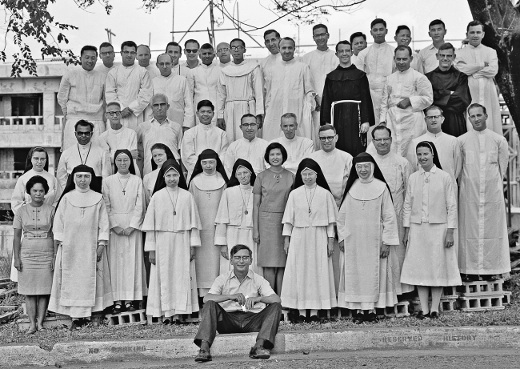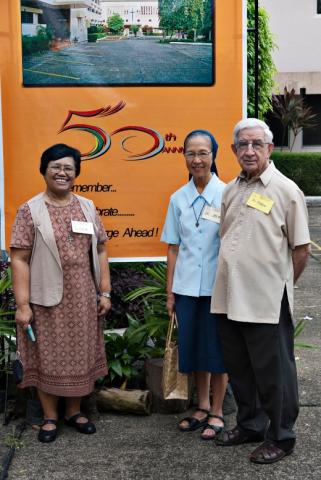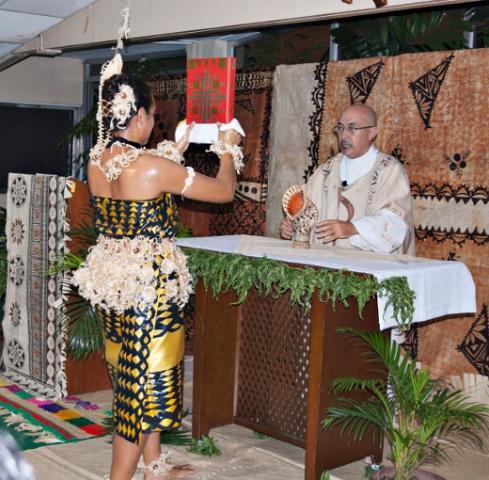The EAPI in Manila celebrated its 50 years since it became known as the East Asian Pastoral Institute in 1961. It was set up in 1955 by Fr. Joannes B. Hofinger SJ as the Institute of Missionary Apologetics. However, the name was changed in 1961 as Fr José Maria Calle SJ, the last of the EAPI founding team, recounted in 2009.
One evening in September 1961, Fr. Brunner and myself were taking a walk with Fr. Hofinger around the quarters of Chabanel Hall. He had just arrived from giving several courses in South Africa. At one point he stopped and said: “You know, quite a good number of people who attend my lectures find rather strange the name of our institute. They don’t know what we mean by “Mission Apologetics.” “Neither do I,” I said. That evening of September 1961, among the quonset huts of Mandaluyong, through a very informal sharing, the name East Asian Pastoral Institute was heard for the first time. And as a result, the EAPI Team was born.
 The first course began on September 1, 1966, with 34 students. Fifty years later, EAPI has more than 5,000 alumni. The current programmes – Pastoral Renewal and Flexible Sabbatical – have 56 participants from 16 countries in Asia, the Pacific, and Africa.
The first course began on September 1, 1966, with 34 students. Fifty years later, EAPI has more than 5,000 alumni. The current programmes – Pastoral Renewal and Flexible Sabbatical – have 56 participants from 16 countries in Asia, the Pacific, and Africa.
In 2012, EAPI will offer four programmes – Pastoral Leadership and Management for Mission from January 4 to May 18, the Pastoral Renewal Programme from July 1 to December 14 and the long and short Flexible Sabbatical Programmes.
The anniversary was marked by a week-long celebration held from September 26 to 30 that included a sports festival, cultural exhibitions and presentations and a day of recollection.
“I was told that this was the first time that the staff and students had ever celebrated together with such a marvellous and terrific spirit as we prepared ourselves in body, mind and soul to forge ahead into whatever comes in the festival week,” said Fr Silito Emeni Topou, a participant from Tonga and one of the organizers.
In keeping with the international community at EAPI, the celebration included cultural exhibitions and presentations featuring the songs and dances of the countries represented at the institute, as well as special dishes at dinner. Monday, September 26, was “Southeast Asia” day with Thailand, Indonesia, Myanmar, and host Philippines. Tuesday was the day of the “chopstick countries” – China, Korea and Vietnam. Wednesday was for the South Asian and African countries represented by Bangladesh, India, Sri Lanka, Rwanda, and Zimbabwe.
 During the day of recollection on September 29, Carmencita Rojas and Paul Sim shared profound reflections to lead the community in pondering the words, “Remember” and “Forge Ahead.” In his homily during the Eucharist, Fr Patrick Pradhan SJ offered his thoughts on “Celebrating”.
During the day of recollection on September 29, Carmencita Rojas and Paul Sim shared profound reflections to lead the community in pondering the words, “Remember” and “Forge Ahead.” In his homily during the Eucharist, Fr Patrick Pradhan SJ offered his thoughts on “Celebrating”.
The annual Alumni Homecoming and the official celebration of the 50th anniversary completed the celebrations on September 30, which was attended by staff, students and guests including former staff members Fr Roger Champoux SJ, Luz Hufancia, Marcy Ramos, Fr Tom O’Gorman SJ and Teresita Nitorreda.
Fr Felipe Gómez SJ presented the history of institute, and EAPI Director Fr Arthur Leger SJ celebrated an inculturated Eucharist with symbols and gestures from the Pacific.
The celebration of the 50th anniversary was also a cause for looking ahead into the future as EAPI continues to evolve and grow to serve the local Churches as they try to cope with the changes caused by globalisation. There is a need to support the laity in their efforts to fully participate in the Church. The clergy and religious consistently express their need for theological and spiritual renewal and lea dership skills that will assist them in their apostolates.
dership skills that will assist them in their apostolates.
At the conclusion of the celebration, Fr Arthur said, “Today the Spirit of Jesus continues to pour out His gifts, especially joy upon us, guiding us into the future. He invites a new hearing of the Scriptures in our local cultures so that we may become credible conch blowers of the word of forgiveness before the world that yearns for spiritual joy. We are invited to pick up the conch and proclaim anew the message of salvation, forging ahead—so that ‘our joy may be complete’ (1 Jn 1:4).”

